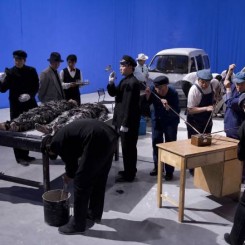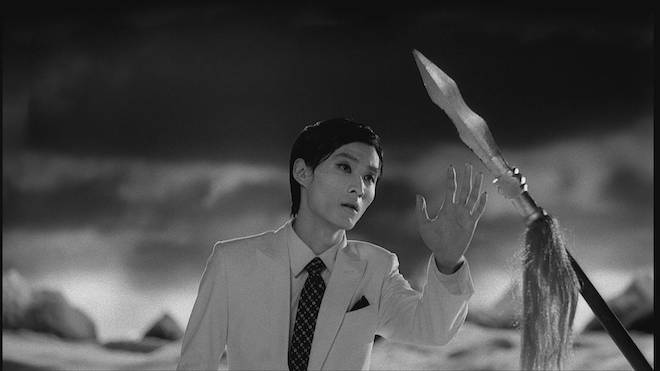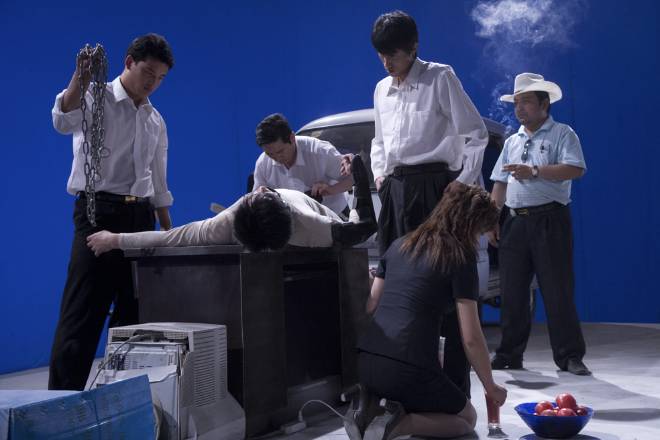As consumers of cinema, as addicts, we mainline film’s nostalgia, the way it seduces our caved Platonic souls to believe in brusque impressions. We feel the awkwardness of cinematic ghosts, even empathize with them, blinding ourselves like Oedipus because of an excess of identification. The phantoms, of course, are not merely individuals, but also those of history, society and culture. Which raises a curious question: if “All the world’s a stage. And all the men and women merely players” — locked in Plato’s warm embrace — how can we be critical without being absurd? The question in the context of China is particularly poignant (and frequently overlooked in the West) because of the multiple histories in which people must live. Culture in Germany or America is similarly conflicted but not divided. Two artists have considered this conundrum in recent films, Yang Fudong and Wang Jianwei.
Yang Fudong’s “Ye Jiang” (“The Nightman Cometh,” 2011) plays on the double meaning of the characters “夜将” (yejiang), that is, “nightfall imminent” and “the general at night-time” — the latter referencing Yang’s earlier “General’s Smile” (2009). In that film an aged revolutionary hero is honored at a sumptuous party (with an absurd Western menu), then comforted by a young woman, perhaps his granddaughter, and finally left alone in a simple cot to private reveries, to sleep. The English title also plays with slippages. The American playwright, Eugene O’Neill’s famous Depression-era play about alcoholic delusion and delusions of redemption is called The Iceman Cometh.
Since Yang’s multi-screen “Dawn Mist Separation” installation, which used traditional 35mm projectors (and projectionists)(1). In 2010 came “Fifth Night,” a parallel three-screen installation showing a street scene with multiple perspectives of multiple narratives, but with even less narrative or sequential context than “Dawn.” All the action takes place at a moment of heightened tension, with no beginning, no crescendo, and no denouement. All the players, each one “subjective,” is equally blind and perplexed, like Rosencrantz and Guildenstern in Tom Stoppard’s rendering of Hamlet. Everything takes place now. We see everything, know everything, and yet we are existentially blind — God with Alzheimer’s. Indeed it is arguable that such focus on the present, the subjective, even egotistical, moment of heightened tension, is a specific counterpoint to grand narratives of historical progress, the teleology of politics, whether in the guise of Marxism or Capitalism, that ignores, forgets and even sacrifices the individual. What next?
The scene of “The Nightman Cometh” is a snow-covered battleground. A general — it is not important which ancient (or modern) dynasty he lives in — surveys the devastation glimpsed amid snowdrifts. The field has a high horizon, a directorial device to create the impression of wide-open space without having to supply it, so we are purblind. Apparently only his horse has survived. He makes a fire. An effete young man in a white suit, 1930s cut, gingerly fingering a handkerchief comes into view. Two female characters, one in ancient costume and one in 1930s, recall Isaac Julien’s goddesses in his “10,000 Waves” (2010). (This is not incidental, as Julien and Yang are friends — Yang even played the lover in “10,000 Waves.”) Snow falls gently. Yes, it is fake, like the whole confection, but to engage with the film narrative we forget this. The snow for us is real — cold, wet, noisome. A hawk watches, totem-like. The young man and woman from the 1930s are both inappropriately dressed — for a cocktail party really, recalling Yang’s series, Ms. Huang at M Last Night (2006). These Proustian madeleines count. Yang’s films are as much about the memory of film as they are things you actually look at. Each character is in some way a ghost from other films, including those of other artists, such as Akira Kurosawa’s “Throne of Blood” (1957), which set Macbeth in feudal Japan. I have already mentioned Julien, but as relevant perhaps are animation filmmakers, Zhou Xiaohu and Sun Xun. There is even something of Wim Wenders’s gray angels hovering in cinematic black and white; color would be insincere. Yet these are hardly references at all but evocations, soundings in our filmic consciousness. The musical soundtrack by long-time Yang collaborator, Jin Wang, adds further tension and abstraction to the visual aporias of the story, leaving us as lost as the dandy and the two women. These anachronistic interlopers, princelings from the future, struggle to relate to their forebears, their hardships, their violence, and their deaths, to how a general’s smile can linger.
Now consider Wang Jianwei’s “Symptom” (2007-8). The narrative plays out on a stage, like Yang’s “Fifth Night” or Lars von Trier’s “Dogville” — it’s a set up. Like Yang’s “Nightman Cometh,” characters dress in conflicting historical and social styles, but there are other disjunctions too. People crowd the small stage as the camera tracks around, only sometimes cutting to a close-up to highlight items and expressions. It feels like a music box unwinding. There are traditional monks, a modern policeman, a waiter, a businessman and his female secretary, a soldier, a 1930s film noir detective, two bodies, a man and a woman, both naked — lovers? — there is even a traditional warrior. All the players are Chinese but a paunchy man, seemingly the minibus driver, wears the clichéd cowboy hat of a Mississippi man along with gold-rimmed sunglasses hanging from his shirt collar. An investigation is taking place into the deaths. Janitors and workers attempt to prise open a small, carved wooden box. The bodies are discovered buried in dirt and exhumed. An autopsy takes place, removing filthy shredded bandages to expose the bodies. Two monks stand nearby but bound, one reacts to one of the investigators, heading him in the face. Meanwhile the waiter offers drinks to the investigators. We move around the stage further, a traditional physician cups the back of a man bent over a rock. The warrior asks the doctor something. Actors in animal skins and the workers are confronted by the warrior, his sword drawn. The office worker is mostly busy at his desk with two computers, while his secretary concerns herself with preparing juice in a blender — a cocktail, a poison drink, blood? Later the office worker (a bureaucrat?) is taken away by the police, put in chains, his computers and papers confiscated. The stage moves round. Inside the van we see bloody bones — a rib cage, a femur. Two businessmen are drinking the fresh juice. Suddenly the soldier sprays the area with a fire extinguisher — extinguishing what?
“Symptom” is a vial of concentrated associations and red herrings begging to be released. History, memory, metaphor, fact, fiction, fear, suspicion and propaganda collide, seeming to make sense without ever doing so — and we, omniscient viewers, we have seen everything, the whole panoptic story. If Yang Fudong’s “Fifth Night” is an exercise in privileging the peak moment of tension, then Wang Jianwei is providing a surfeit of context. Yet the effect of both is to silence by parading everything we need to know while simultaneously relegating us to the narrative periphery, unable to connect the dots. The viewer is but the beholder of yet another perspective. But this is not a case of post-modern relativism, where all perspectives are notionally valid, but rather the difficulty of speaking of what we witness, the ability to stand outside history. The problem is existential: what do I know?
The theatrical setting, the soap-opera costumes, the tendentious scenes, the melodramatic expressions, all culled from umpteen revolutionary and post-revolutionary films, soap-operas, myths and school history books, are neither sincere nor insincere, uninterested nor pedagogic. Wang is not asking us to think this way or that. He does entreat us to interpret — it’s part of the joke — seducing us into thinking we can know what is going on. But don’t judge, don’t jump, because the audience is always part of the theatre — a play does not happen alone. You’re in it too. All that we witness has only the meanings we give it, and from where did we get those? The music in “Symptom” recalls the same airless, pre-crescendo score used to maintain the tension in “Fifth Night” and “The Nightman Cometh.” You feel your muscles tightening, pressure rising, and the onset of queasiness. It is the unease of a parent watching their child on a merry-go-round. It seems anodyne, banal even, yet we feel something is wrong, we don’t know what.
After Alfred Hitchcock, Orson Welles and Jean-Luc Godard, and a few of their friends, what else is left to say in narrative cinema? Its progress now is a matter of nuance. For this reason the most innovative Western cinema of the 80s and 90s was often in music videos, and in the 21st century in video art. Just look at the new paean to cinema by Tacita Dean in Tate Modern’s Turbine Hall, “Film,” or Sarah Morris’s tribute to Mies van der Rohe and Philip Johnson, “Points on a Line” (2010), or any of the works of Zhang Peili or Isaac Julien or Bill Viola or Christian Marclay. Or, or, or. There is almost no cinema left but what art makes of its remains. Both Yang Fudong and Wang Jianwei know this but both are sufficiently romantic to understand that film still has immense residual value, being along with photography the most sensual of all art forms. But they don’t pay out. There is no denouement, just another turn of the music box drum. There are no resolutions here, no happy endings, just a miasma of doubt, at once comforting and terrifying, an opiate dream suffusing reality as images flicker on the wall of the cave. The infinite time continuum – our pre-existence then oblivion – is interrupted by momentary confusion: life – contingent, temporary and fragile. Thinking themselves real, ghosts mistake the situation and suffer the embarrassment of the uninvited guest. Unable to fathom what they witness, they suffer first the nausea of existence, then the vertigo of perspective, before slumping back into reflection, repetition, and amnesia — death. Rarely is there enlightenment, for they are part of the trick of perception, to which they are blind.
Notes
Wang Jianwei’s “Symptom” premiered at ArtBasel, Switzerland, 2012.
Yang Fudong’s “Dawn Mist Separation” premiered along with “General’s Smile” and “Blue Kylin” at the Zendai MoMA, May-August 2009.
“The Nightman Cometh” premiered at the exhibition “Waterworks,” with Geng Jianyi and Wu Shanzhuan, curated by Phil Tinari, ShanghArt Gallery, Shanghai, September 6-October 30, 2011
Thanks to Clare Jacobson.





